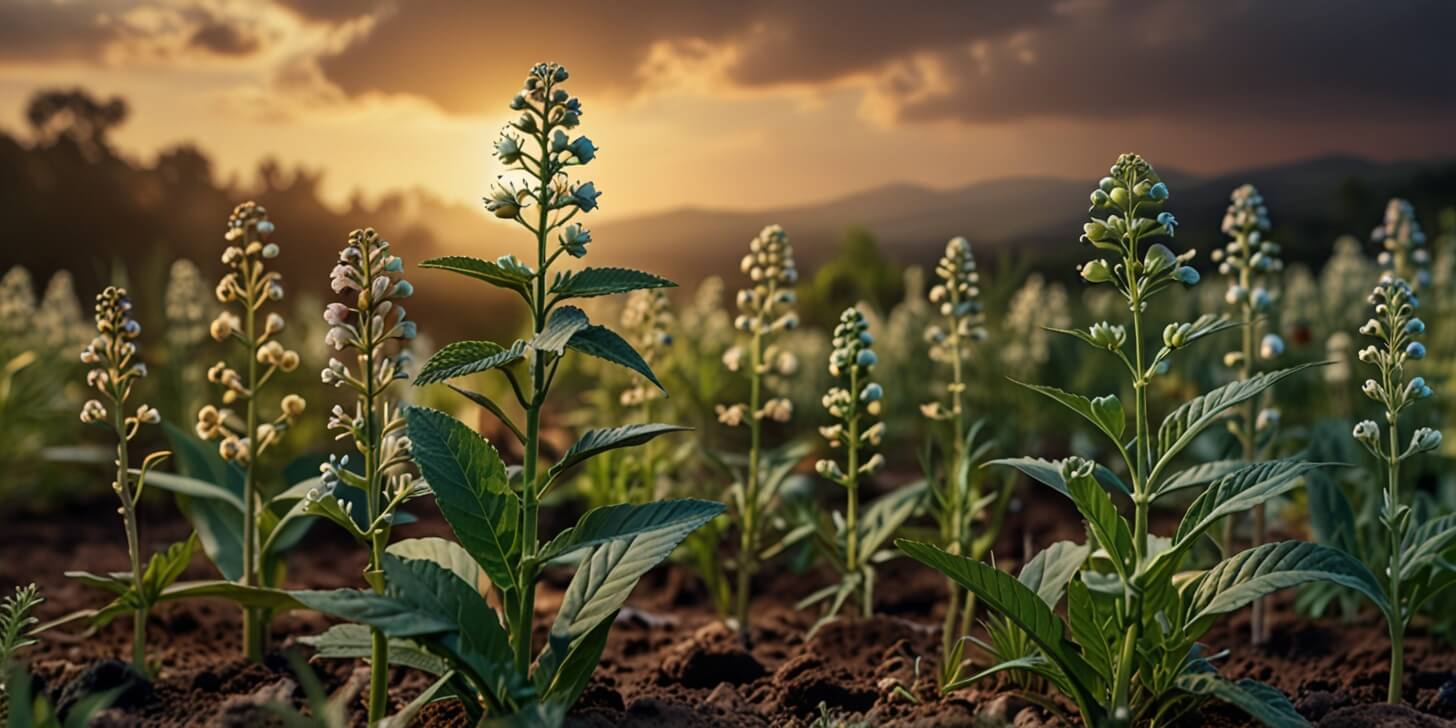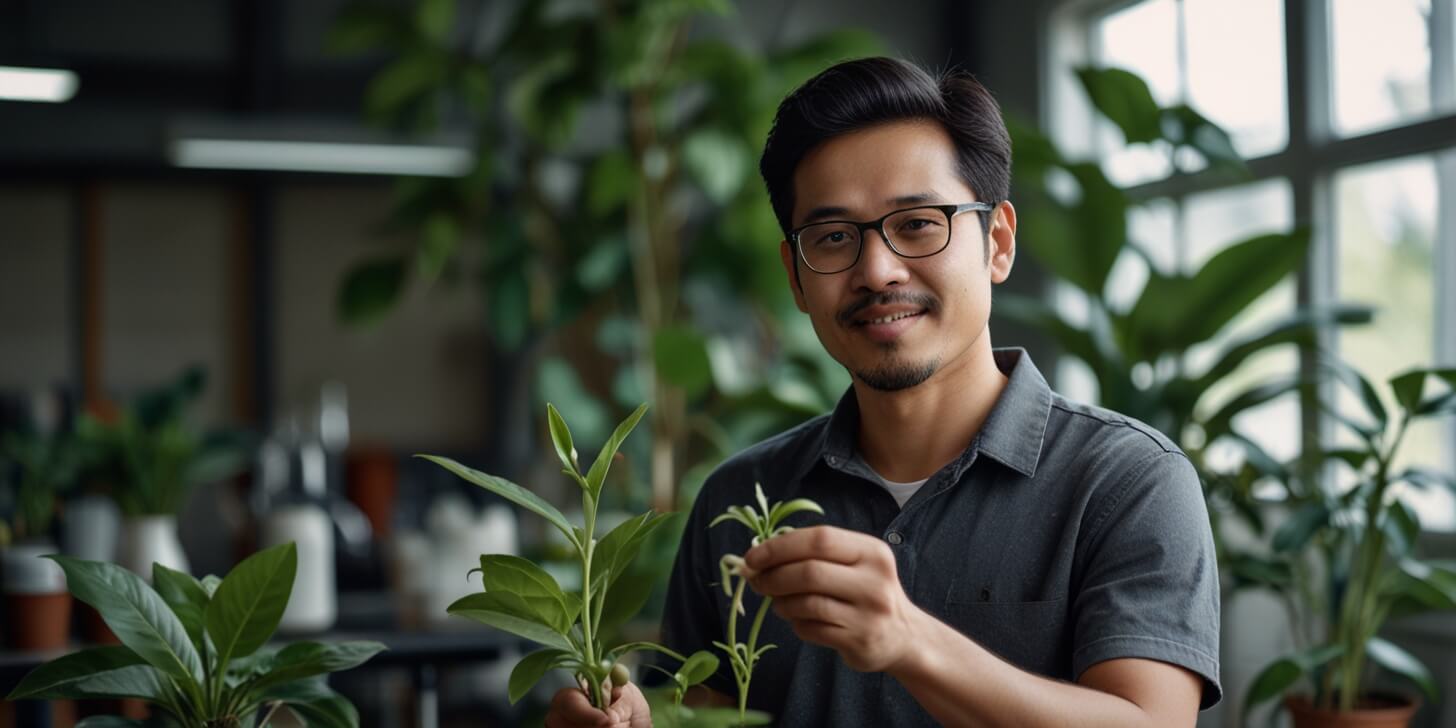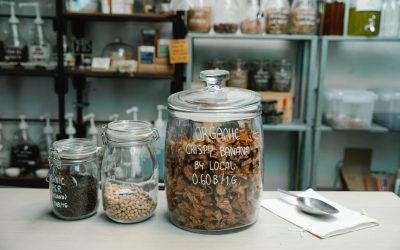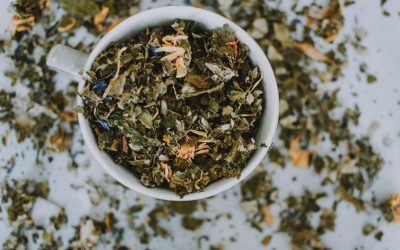Just as Achilles’ heel was his singular point of vulnerability, modern medicine often faces its own in the form of viral diseases, leaving you to wonder if nature holds a key to fortifying our defenses. You’ve likely heard whispers of plants like garlic and echinacea warding off illnesses, but the true potential of antiviral plants in combating viral infections is a tapestry woven with both historical wisdom and contemporary science. These natural allies may offer you more than just folklore remedies; they’re backed by studies that show significant promise. While you’re considering the implications of integrating these botanicals into your health regimen, ponder the intricate ways in which these plants may interact with your body’s own viral defenses, potentially ushering in an era of complementary medicine where green leaves might be as revered as white coats.
Key Takeaways
- Medicinal plants like Garlic and Elderberry have a long history of use in combating viral infections, and their effectiveness is supported by scientific validation.
- Plant extracts contain bioactive compounds that inhibit virus replication and stimulate the immune response, making them potential treatments for viral diseases.
- The use of plant remedies, such as Echinacea, Ginger, Elderberry, and Garlic, could offer a complementary approach to conventional medical interventions for viral diseases.
- Advances in separation technologies have made it more efficient to isolate and extract potent antiviral components from medicinal plants, fueling drug discovery and the development of targeted antiviral therapies.
Historical Use of Antiviral Plants

For centuries, people have turned to medicinal plants, such as Garlic and Elderberry, to combat viral infections, a practice supported by scientific studies that confirm their antiviral properties. These natural antivirals have been a cornerstone in herbal medicine, providing relief and protection against a spectrum of viruses.
Deeply embedded in traditional Chinese medicine and other cultural healing systems, antiviral medicinal plants have been meticulously documented for their ability to bolster the immune system. For instance, Garlic has been revered not only for its culinary contributions but also for its efficacy against respiratory infections. Its compounds have shown inhibitory effects on viruses like the influenza virus and even the herpes simplex virus type.
Elderberry is another powerhouse, with a history of use against colds and influenza. Its extracts have been studied for their impact on virus replication and immune enhancement. Similarly, plants like Astragalus and Licorice, staples in traditional healing practices, have demonstrated promising medicinal effects against viruses such as hepatitis B virus (HBV) and HIV.
The ethnopharmacological wisdom passed down through generations has paved the way for modern research to validate the historical use of these plants. Scientific rigor has confirmed that Carissa edulis Vahl and Geranium sanguineum, among others, possess strong antiviral activities, thereby acknowledging their roles in traditional herbal medicine.
As you seek to serve others with natural remedies, it’s vital to respect and understand the historical significance of these plants. Their long-standing recognition as antiviral agents is not only a testament to their medicinal effects but also a nod to the cultural knowledge that has safeguarded this information for future generations.
Key Antiviral Phytochemicals
Building on the historical use of antiviral plants, it’s essential to explore the specific phytochemicals that endow these herbs with their potent virus-fighting capabilities. You now know that medicinal plants are more than just folk remedies—they’re reservoirs of bioactive compounds with scientifically proven antiviral properties. These phytochemicals are the active components that can inhibit viral infections by interfering with the virus’s ability to replicate.
To better serve those in need of natural therapeutic options, let’s delve into some key antiviral phytochemicals that have been identified in plant extracts. Their inhibitory activity against a range of viruses is not only fascinating but also a beacon of hope for developing alternative antiviral treatments.
| Phytochemical | Known Antiviral Activity |
|---|---|
| Baicalein | Inhibits dengue, hepatitis C, and influenza |
| Curcumin | Shows potential against HIV and certain influenza strains |
| Sambucus nigra | Stimulates immune response, targets influenza |
| Secomet-V extract | Broad-spectrum activity, including against SARS |
These antiviral natural products demonstrate that plants are not simply passive entities in our environment. They are potent allies in the fight against viral diseases, offering a range of phytochemicals that can be mobilized to protect human health.
As you consider these phytochemicals, understand that their antiviral activity is a subject of ongoing research. The journey from plant to pill is rigorous, culturally sensitive, and requires a deep respect for the complexity of both the plant world and viral pathogens. Remember, while these phytochemicals are promising, they should complement, not replace, conventional medical advice and treatment.
Plant Defenses Against Viruses

Plants have developed sophisticated defenses against viruses, some of which can be harnessed to bolster our own antiviral capabilities. These natural strategies are not only vital for the survival of plants but also offer a treasure trove of medicinal properties that you can tap into to combat viral diseases. By understanding and utilizing these defenses, you’re able to support the immune system and provide relief, especially from respiratory infections that trouble so many.
The antiviral activity of plants comes from a variety of compounds they produce, which can inhibit virus replication and strengthen the body’s natural defenses. Here’s a rundown of how plants defend themselves—and how these mechanisms can aid human health:
- Inhibit Virus Replication: Certain plant extracts contain compounds that directly interfere with the ability of viruses to replicate, thereby halting the progression of the infection.
- Boost Immune Response: Some extracts can stimulate the body’s immune system, enhancing the production of cytokines and interferon, which play crucial roles in fighting off viral infections.
- Broad-Spectrum Effects: A range of plant extracts show antiviral activity against multiple viruses, suggesting their potential as versatile antiviral agents.
- Essential Oils: Plants like Carissa edulis produce essential oils with components that have been found to disrupt viral envelopes or interfere with viral entry into host cells.
- Natural and Safe: As natural products, many plant-based extracts offer a safer alternative to synthetic drugs, with fewer side effects and a longstanding history of medicinal use.
Common Viral Diseases and Plant Remedies
How can the powerful antiviral properties of medicinal plants offer relief for those suffering from common viral diseases such as HIV, HSV, and influenza? You’re aware of the significant global burden these infections pose, and it’s essential to recognize the potential of natural products and herbal medicines in this fight. Medicinal plants extracts, brimming with phytochemicals, provide a treasure trove of compounds with broad-spectrum antiviral activity.
Herbal medicine has been a cornerstone of health care for centuries, with antiviral herbs and supplements playing a crucial role in managing and treating viral infections. Elderberry, for example, has been shown to mitigate symptoms and reduce the duration of influenza. Similarly, extracts from Carissa edulis Vahl exhibit potent activity against HIV, offering hope for those seeking alternative treatments.
The quest for antiviral drugs has led scientists to explore the immune-stimulating and virus replication-inhibiting effects of these plant-derived compounds. With respiratory infections like the influenza virus and respiratory syncytial virus (RSV) impacting millions annually, the antiviral efficacy of plants like Geranium sanguineum becomes increasingly relevant. Its constituents can thwart viral entry and replication, crucial steps in managing the spread of diseases.
Moreover, the severe acute respiratory syndrome (SARS) and similar illnesses have highlighted the need for effective treatments. The discovery of medicinal plants with antiviral properties provides a complementary approach to traditional antiviral drugs, often with fewer side effects and at a lower cost.
You, aiming to serve others, can appreciate the value of integrating these natural remedies into health care, especially when they’re backed by rigorous scientific validation. It’s not just about offering hope but about delivering real, evidence-based solutions to those in need.
Research Insights on Plant Antivirals

Recognizing the historical use of medicinal plants in treating common viruses, recent research has provided deeper insights into the antiviral properties of these natural remedies. As someone committed to serving others, you’ll appreciate how advancements in herbal medicine are offering new possibilities in the fight against viral diseases, including HIV and respiratory infections.
A study found that certain medicinal plants exhibit potent antiviral activities, interfering with viral replication and hindering the spread of infections. These findings suggest that natural antivirals could become crucial in managing diseases where conventional treatments fall short due to resistance or adverse effects.
- Broad-spectrum antiviral effects: Some plant extracts can target multiple viruses, reducing the need for specific antiviral drugs.
- Advancements in separation technologies: These innovations allow researchers to isolate antiviral components from plants more efficiently, fueling drug discovery.
- Potential antiviral solutions: Plant-based compounds may address the limitations of synthetic drugs, such as side effects and resistance.
- Pharmaceutical applications: Translating traditional knowledge into modern medicine can accelerate the development of novel antiviral agents.
- Antiviral potential against HIV: Medicinal plants have shown promise in inhibiting HIV-1 and HIV-2, which could lead to alternative therapies.
Cultivating and Using Antiviral Herbs
Harnessing the power of antiviral herbs, you can cultivate plants like lemon balm and garlic in your garden to create natural remedies that bolster the immune system and combat viral infections. These plants serve as effective antiviral agents and provide a holistic approach to health care. When you grow and use these herbs, you’re tapping into ancient practices that have been validated by modern science.
Lemon balm, for instance, contains compounds that have been shown to inhibit the replication of certain viruses. You can make an extract of the leaves to soothe symptoms of cold sores caused by the herpes simplex virus. Similarly, garlic, with its potent antioxidant properties, has been found to boost immune function while also acting against a variety of pathogens.
Incorporating a variety of these herbs into your regime could complement active antiretroviral therapy (HAART) for those managing HIV, although it’s crucial to consult healthcare providers before making any changes to your treatment plan. Herbal medicine, including Chinese medicinal herbs like astragalus and licorice, has a rich tradition of supporting health, particularly immune health.
Creating essential oils from herbs like thyme and oregano offers another avenue for utilizing antiviral properties. These concentrated oils can be used topically or diffused into the air to help purify the environment and provide respiratory support.
Remember that while these herbs can boost immune responses and act as supplementary treatments, they should be used responsibly and in conjunction with conventional medicine when dealing with serious viral infections. Always ensure you’re well-informed about the proper use and dosage of these natural remedies to maximize their benefits safely.











